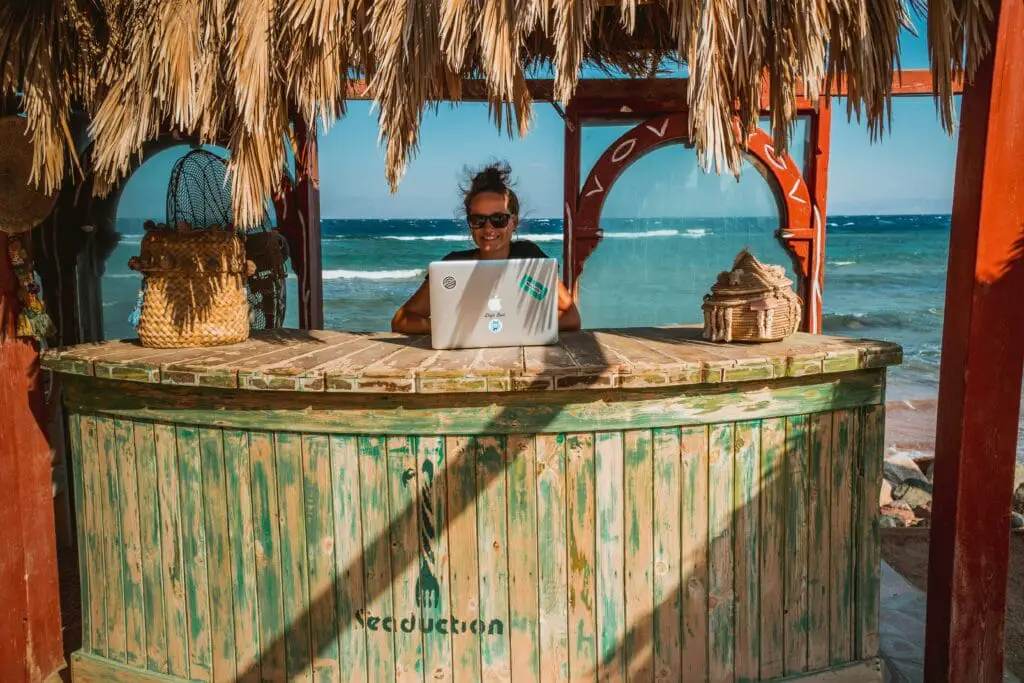Remote work and digital nomad jobs are shaking up how people live and earn a living. These days, more folks are choosing to work from other countries or new cities, enjoying the flexibility of setting their own hours.
Remote jobs let people work from almost anywhere with a solid internet connection, so it’s totally possible to travel while making money.
Tech improvements, open-minded companies, and easy access to remote job boards have opened doors in writing, design, tech, teaching, and loads of other fields. There are even sites dedicated to helping people find the best remote digital nomad jobs to match all kinds of skills and work styles.
Getting the basics of remote work, and the steps to work abroad, can help you figure out if this lifestyle lines up with your goals. If you’re curious about living and working in new places, remote jobs offer a real shot at seeing the world and keeping a steady paycheck.
Key Takeaways
- Remote work and digital nomad jobs open up flexible ways to earn and travel.
- Finding trustworthy remote jobs means using reliable job boards and doing your homework.
- Legal requirements and practical lifestyle tips matter for success abroad.

Understanding Remote Work and Digital Nomadism
Remote work lets people do their jobs without being stuck in one spot. Software development, writing, and design, these gigs can now happen from anywhere with internet and the right digital tools.
This shift has sparked new lifestyles and work choices for a lot of people.
Defining Remote Work, Work From Abroad, and Digital Nomad Jobs
Remote work means doing your job away from the company’s office. Most remote workers rely on computers, phones, and online platforms to get things done and keep in touch with their teams.
Some stay in their home country, while others bounce around to different places, even while traveling.
Work from abroad is holding a remote job but doing it from a country that isn’t your employer’s. This usually means you’ll need to figure out visa rules and tax stuff.
A digital nomad is someone who travels to different places while working online. Digital nomad jobs cover marketing, tech support, teaching languages, and graphic design, just to name a few.
They pick their next stop based on internet quality, cost of living, and local vibe. Lately, more people are calling themselves digital nomads as remote work keeps growing.
Key Benefits and Challenges of Working Remotely
Benefits:
- Flexibility: Set your own hours and work from wherever you want.
- Broader Opportunities: Access jobs that used to be limited by where you lived.
- Travel and Cultural Experiences: Explore new countries while making a living.
- Work-Life Balance: Many people find it easier to juggle work and personal life.
Challenges:
- Legal and Tax Complexities: Visa, residency, and tax laws can get confusing fast. Staying on top of paperwork and rules is a must, there’s more info on legal and financial considerations.
- Isolation: Working solo or in unfamiliar places can feel lonely.
- Unstable Internet or Workspaces: Not every spot has solid Wi-Fi or a quiet place to work.
- Work Security: Some remote gigs come with less job security or fewer benefits.
Essential Skills for Digital Nomads
Digital nomads need both technical know-how and personal skills to thrive:
- Tech Skills: You’ve got to be comfortable with online meetings, cloud storage, and communication apps. Basic troubleshooting is handy too.
- Time Management: You’ll need to keep routines and hit deadlines without someone looking over your shoulder.
- Adaptability: Moving around means dealing with new cultures, environments, and time zones all the time.
- Self-Motivation: Without a boss nearby, it’s on you to stay focused and productive.
- Communication: Clear writing and speaking can stop misunderstandings, especially when working across borders.
If you’re organized and don’t mind a bit of uncertainty, you’ll probably handle the ups and downs of this lifestyle just fine.

Top Destinations for Working Remotely
Lots of countries now offer special digital nomad visas. Some cities are turning into hotspots for remote workers, with good infrastructure and buzzing communities.
Countries Offering Digital Nomad Visas
A digital nomad visa lets remote workers live and work abroad for months, or even years. You’ll usually need to show proof of income and health insurance. Some places want a background check, too.
Popular countries offering digital nomad visas include:
- Portugal: Warm weather, safe cities, and a pretty straightforward visa process. Lisbon and Porto are crowd favorites.
- Costa Rica: Digital nomad visa available, plus nature and a laid-back vibe. You can stay for up to a year, and maybe renew.
- Cabo Verde: This island nation in Africa welcomes remote workers with a simple visa program.
- Cayman Islands: The Global Citizen Concierge Program lets you live in the Caribbean for up to two years.
Estonia and Croatia are joining in with their own flexible visa options. These programs work for freelancers and employees who want to spend more time abroad. Check out more countries offering digital nomad visas.
Most Popular Digital Nomad Cities
Some cities really stand out for remote work thanks to fast internet, safety, affordable living, and social scenes.
Top digital nomad cities in 2025 include:
- Lisbon, Portugal: Fast Wi-Fi, a big expat crowd, and nice weather. Neighborhoods like Alfama and Chiado have coworking spaces and cafés everywhere.
- Copenhagen, Denmark: Clean, reliable, and full of coworking spots.
- San José, Costa Rica: Rainforests, beaches, and city comforts all in one place.
- Praia, Cabo Verde: Beautiful islands and easy visa access, pretty tempting for remote workers.
Cities with established nomad communities help newcomers settle in quicker. They’re great for networking, finding resources, and getting that sweet work-life balance. Want more? Here are some top remote work locations worldwide.

Navigating Digital Nomad Visas and Legal Requirements
Digital nomad visas let remote workers live and work abroad legally for longer stretches. You’ll want to know what these visas allow, the usual requirements, and how to apply.
Overview of Digital Nomad Visas
A digital nomad visa is a special permit for remote workers who earn income from outside the country they’re visiting. These visas are popping up everywhere, Portugal, Estonia, Croatia, you name it.
Each country makes its own rules, like minimum income, proof of health insurance, and background checks. Usually, you can’t use these visas to work for local employers.
Here’s a quick look at common digital nomad visa requirements:
| Requirement | Common Example |
|---|---|
| Remote Income | $2,000-$3,500 monthly |
| Valid Health Insurance | Coverage in host country |
| Clean Criminal Record | Police background check |
Visa length depends on the country, anywhere from 6 months to 2 years. For more info? Read up on digital nomad visas across the world.
Application Process and Eligibility
Most people start their digital nomad visa application online. You’ll fill out forms, upload ID, show proof of remote work or freelance income, and sometimes get a letter from your employer.
Eligibility rules change from country to country, but usually include:
- Remote income that meets the minimum requirement
- Proof of ongoing work like a contract or client agreements
- Health insurance that covers you while you’re there
Some applications also ask for a clean police clearance. Fees are common, and you might wait a few weeks or even months for approval, depending on where you’re headed.
Double-check each country’s application process and digital nomad visa requirements for the details. Make sure your documents are valid, complete, and translated if they need to be.

Finding and Securing Digital Nomad Jobs
Remote jobs exist in all kinds of industries now, so plenty of people can work from wherever they like. Knowing where to look, and how to get ready, can really boost your odds of landing a digital nomad job.
Industries and Roles Suited for Remote Work
You’ll find many digital nomad jobs in tech, creative, and business roles. Think software development, graphic design, writing, customer support, and marketing.
IT and coding jobs are everywhere since you just need a secure internet connection. Content creation, digital marketing, project management, and online teaching are big, too. Data entry, virtual assistant gigs, and accounting are out there as well. If you know another language, translation and transcription can be a perfect fit.
Most companies looking for remote workers want people who are good with digital tools and can manage their own time. Always check job listings for location restrictions, some jobs require you to be in certain time zones or countries.
Top Platforms and Resources for Job Seekers
There are a bunch of websites listing remote jobs for digital nomads. Working Nomads posts remote positions worldwide in all kinds of industries.
FlexJobs offers a big selection of reliable, flexible, and remote jobs. If you want even more options, check out Digital Nomads World Jobs for remote and work-from-home gigs.
Go Overseas shares the latest fully remote digital nomad jobs too. For real-world advice, Reddit’s digital nomad board is a goldmine of tips from people already living this life.
Some job boards focus on tech or freelance roles. Others list full-time, part-time, or contract work.
To boost your chances, try more than one platform and set up job alerts. It’s a bit more work, but it pays off.
Building a Successful Remote Career
A strong resume and a focused LinkedIn profile help you stand out. Employers want self-motivated folks who can work solo and communicate well online.
Highlight any experience with digital projects or working across locations. If you’re in a creative or tech field, a sharp online portfolio lets hiring managers see what you can do.
Reliable internet, solid time management, and cross-cultural communication matter a lot. Networking in remote work or digital nomad groups often leads to job tips and support.

Practical Tips for Life as a Digital Nomad
Digital nomads juggle daily challenges while working from new places. Finding routines, managing expenses, and adjusting to new environments all help you stay productive and comfortable on the road.
Staying Productive and Connected
You really need a good internet connection when working abroad. Always check Wi-Fi speed and have backup options like a local SIM card or portable hotspot before settling in.
Try booking accommodations for just a week or two at first. Once you know it works for you, negotiate a better rate with the host.
Set clear work hours and carve out a workspace, even if it’s just a corner. Productivity tools like time trackers or online calendars help keep up with meetings and deadlines, especially when you’re bouncing between time zones.
Connecting with other remote workers in coworking spaces or online groups offers both community and accountability. If you want more ideas, there are plenty of lists out there, like 25 practical and useful tips for digital nomads working and living around the world.
Managing Finances and Taxes Abroad
Money management is a top concern for digital nomads. Use online banks or apps with low foreign transaction fees.
Keep a mix of local cash and digital payment methods to make shopping and emergencies less stressful. Taxes can get tricky if you’re working from several countries.
Check both your home country and host country tax rules to avoid headaches. Some places ask for special visas or proof of income for digital nomads.
Organize receipts, invoices, and banking records in secure cloud storage. Lots of nomads hire accountants who know international tax laws, or use expat-friendly software.
Review expenses regularly to keep your budget in check and catch mistakes early.
Navigating Language and Cultural Differences
Language barriers pop up all the time when you’re abroad. Learning a few basic local phrases helps with groceries, transit, and just being polite.
Free translation apps make it easier to ask questions or read signs. Understanding local customs can save you from awkward moments.
Dressing appropriately and respecting quiet hours goes a long way with neighbors and hosts. Joining group tours, language exchanges, or meetups is a fun way to learn about the culture and meet people.
Many digital nomads use community forums or social media to get destination-specific advice. It’s a practical way to adapt faster and avoid common mistakes.

Frequently Asked Questions
Digital nomad jobs let you work from almost anywhere, but getting started can feel overwhelming. Where to live, legal stuff, job options, and resources all matter if you’re considering remote work.
How do I get started with digital nomad jobs as a beginner?
If you’re new, start by figuring out your skills and looking for online jobs that fit. Freelance work, customer service, tech support, and writing are common entry points.
Learn about remote work rules and make sure you’ve got a reliable internet connection. Joining online communities or checking out FAQs about digital nomad life can help a lot.
What are the best countries for digital nomads to reside in?
Lots of nomads pick countries with remote work visas and solid infrastructure. Portugal, Thailand, Spain, Mexico, and Estonia are favorites.
They’ve got coworking spaces, affordable living, and fast internet. Some even offer digital nomad visas for longer stays.
Are there age limitations for becoming a digital nomad?
No strict age limits here. People of all ages work remotely, from college grads to retirees.
Some jobs or visas might target certain age groups, but usually, anyone with the right skills and a way to earn online can join in.
How can one find international remote jobs that offer immediate hiring?
Look for remote job boards and filter for ‘immediate start’ roles. Networking in social groups and reaching out to companies directly can open doors.
Websites focused on remote work often tag urgent or immediate hire jobs. Apply fast and keep your resume sharp to boost your chances.
Which job roles are most commonly available for remote work from any location?
Common remote jobs include software development, graphic design, writing, digital marketing, teaching English online, and customer support.
These roles show up on global job boards and fit people who can work solo with just a laptop and internet. Not a bad deal, honestly.
What are some effective platforms for locating 100% remote jobs?
We Work Remotely, FlexJobs, Remote.co, and Oyster HR are some of the top picks for finding fully remote jobs.
You’ll also find sites like Upwork and Fiverr, which lean more toward freelance gigs. These let you work from anywhere as long as you’ve got an internet connection.
You Might Also Like:
If you enjoyed this post on Remote Work and Roaming Free: A Global Career You’ll Love, you might also like: Guide: How to Work Abroad and Make Money While Traveling, Discover the Best Travel Health Insurance for Your Trip, Want to Work Overseas? Discover the Best Countries for Jobs and Rich Culture.
